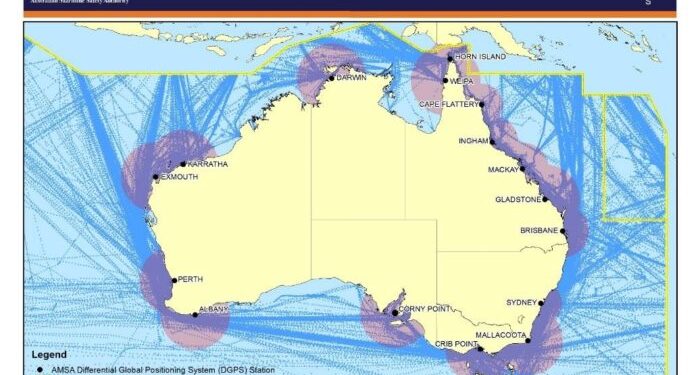AMSA informed that on 1 July 2020 it will discontinue its Differential Global Positioning System (DGPS) service. The increased accuracy of GPS and introduction of other global positioning constellations, such as GLONASS, GALILEO and Beidou, mean that AMSA’s DGPS service is no longer needed.
Currently, GPS is one of several Global Navigation Satellite Systems (GNSS) that provide accurate Position, Navigation and Timing (PNT) information to ships fitted with modern GNSS receivers.
Modern GNSS receivers also offer inbuilt integrity monitoring of positioning, navigation and timing information. Such receivers are now a standard installation on board most ships.
The accuracy and integrity provided by modern GNSS technology is now suitable for safe navigation in Australian waters.
[smlsubform prepend=”GET THE SAFETY4SEA IN YOUR INBOX!” showname=false emailtxt=”” emailholder=”Enter your email address” showsubmit=true submittxt=”Submit” jsthanks=false thankyou=”Thank you for subscribing to our mailing list”]
DGPS is a ground-based GPS augmentation system, operating in the 285 to 325 kHz frequency range. It was introduced in the 1990s, to improve the accuracy and integrity of GPS information for ships navigating off the coast of Australia.
Today, the accuracy of GPS exceeds the accuracy provided by AMSA’s DGPS service. Modern GPS receivers also incorporate automated integrity monitoring functionality, to warn the user when GPS information is degraded. Additionally:
- In the year 2000, US disabled SA. This improved the accuracy of GPS to better than 10 metres. US has stated it has no intention to ever use SA again.
- An analysis of the GPS Standard Positioning Service (SPS) Performance for 2018 indicates an average horizontal accuracy of better than 9 metres. The daily average accuracy of the SPS was measured to be 1.3 metres.
- The international (IMO) requirement for worldwide radionavigation systems in ‘harbour entrances, harbour approaches and coastal waters’ is that the system should provide positional information with an error not greater than 10 metres (95 % probability).
- In 2003, IMO’s GPS receiver performance standards introduced ‘Receiver Autonomous Integrity Monitoring (RAIM)’ technology. It alerts a user to any inaccuracies with particular satellites or their signals. This in turn reduces the relevance of our DGPS service for integrity monitoring purposes.
- The differential correction provided by AMSA’s DGPS service only applies to GPS. Today, there are other Global Navigation Satellite Systems (GNSS) such as GLONASS, GALLILEO and BeiDou.
- Anecdotal evidence suggests some 65% of GNSS receivers track GPS and at least one other GNSS.
- Multi-constellation GNSS receivers provide increasingly accurate positioning.
- In the next 2-3 years, an Australian Satellite-Based Augmentation System project, led by Geoscience Australia (GA), will offer higher accuracy positioning for GNSS users. To benefit from this service, though, you will need an SBAS capable GNSS receiver. More information on the Australian SBAS project is available at the Geoscience Australia website.
- The majority of equipment manufacturers no longer support the hardware and firmware for DGPS reference stations.
- Nations such as US, Japan and South Africa started to discontinue their services as early as 2015.
For the vast majority of maritime users, discontinuation of DGPS should not impact the accuracy of satellite positioning or the safety of navigation.
There will be no impact on Stand-alone GNSS. However, GNSS receivers that have an integrated DGPS/DGNSS receiver, will no longer receive AMSA’s DGPS corrections and may alert or alarm.
This will be no different to what happens today as the receiver moves out of range of a DGPS stations. The effects can be summarised as follows:
1. For GPS and DGPS capable receivers older than or fitted before 2003:
- If your receiver is DGPS enabled, the receiver will no longer receive AMSA’s DGPS signal. It will continue to receive GPS information. This information is likely to be accurate to better than +/- 10 metres.
- Receivers that are older than or fitted before 2003 may not include an integrity monitoring capability. This means that they are unlikely to alert or alarm if integrity of the satellite signal is degraded.
- If your GPS receiver is not DGPS enabled, then its performance will not change. For pre 2003 receivers, you should be aware that there is no integrity monitoring function built into your equipment.
2. For GPS, GNSS or DGPS receivers newer than and fitted after 2003:
- If your receiver is DGPS enabled, the receiver will no longer receive AMSA’s DGPS signal but will continue to receive GPS information. This information is likely to be accurate to better than +/- 10 metres.
- Receivers newer than and fitted after 2003, will monitor the integrity of GPS information as received from GPS satellites. The receiver will alert or alarm if integrity of positional information is degraded.
What to do if your GPS receiver is older than 2003
In case your GPS receiver is older than or fitted before 2003, it might be time to upgrade your receiver. It is unlikely that pre-2003 receivers will monitor the integrity of the information they receive.
If integrity monitoring is important to any operator, then they may wish to replace their satellite navigation receiver with one that includes Receiver Autonomous Integrity Monitoring (RAIM).
For higher accuracy, a multi-constellation GNSS receiver may provide better accuracy than a GPS-only receiver.
The Australian Satellite-Based Augmentation System project, led by Geoscience Australia, will deliver high accuracy positioning for GNSS users. To benefit from this service in the future, operators will need an ‘SBAS’ capable GNSS receiver.






























































